Country gender assessment series
.tmb-th600x450.jpg?Culture=en&sfvrsn=5f9ef71f_1)
Kosovo gender profile for agriculture and rural livelihoods
06/2024
The Kosovo gender profile for agriculture and rural livelihoods aims to improve knowledge on gender‑related issues in agriculture. It proposes evidence‑based recommendations for advancing gender equality.

Gender, agriculture and rural development in Albania
07/2016
The purpose of the Country Gender Assessment of Albania points out some of the major gender inequalities that need to be considered by policy makers and project managers according to available data, and identifies further research needs in a wide range of areas, including fisheries, forestry, local farmer’s cooperation, and women’s real contribution to GDP considering their overwhelming contribution as unpaid family farmers. 2016, 48 p.

National Gender Profile of Agriculture and Rural Livelihoods: Turkey
09/2016
The purpose of the National Gender Profile of Agricultural and Rural Livelihoods - Turkey is to contribute to the production of knowledge for better informed, targeted and gender sensitive actions in agriculture and rural development. This national profile points out some of the major gender inequalities that need to be considered by policy makers and project managers according to available data, and identifies further research needs. 2016, 72 p.

National Gender Profile of Agricultural and Rural Livelihoods. Republic of Tajikistan
06/2016
The purpose of the National Gender Profile of Agricultural and Rural Livelihoods for Tajikistan is to contribute to the production of knowledge for better informed, targeted and gender sensitive actions in agriculture and rural development. 2016, 56 p.

National Gender Profile of Agricultural and Rural Livelihoods: Kyrgyz Republic
06/2016
The purpose of this national gender profile is to collect and compile available data and information from diverse sources in order to shed light on gender disparities in rural settings and the status of rural women across a number of dimensions, with a focus on inequalities in agricultural employment. It aims to provide a picture of the types and degree of the main gender inequalities in agriculture and concerning rural livelihoods in rural Kyrgyzstan. 2016, 68 p.
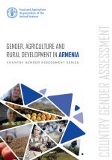
Gender, agriculture and rural development in Armenia
03/2017
The purpose of the Country Gender Assessment for Armenia is to contribute to the production of knowledge for better informed, targeted and gender sensitive actions in agriculture and rural development, serve as a tool for FAO, and raise public awareness. This Gender Assessment points out some of the major gender inequalities that need to be considered by policy makers and project managers according to available data, and identifies further research needs. 2017, 56 p.
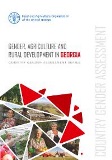
Gender, agriculture and rural development in Georgia
07/2018
This assessment highlights the challenges, gaps and practices in the area of gender and agriculture and rural development in Georgia. These include: the gap between policies, legislation and their implementation; the gender gap in earnings; the vertical and horizontal gender-based segregation in employment; the widespread of gender stereotypes; the rigid division of gender roles and decision-making at all levels, and other systemic issues. 2018, 86 p.
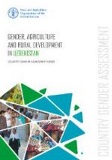
Gender, agriculture and rural development in Uzbekistan
06/2019
Gender equality is a key to eliminating poverty and hunger. The Country Gender Assessment for Uzbekistan can contribute to the production of knowledge for better informed, targeted and gender sensitive actions in agriculture and rural development. It has been produced in line with the FAO Policy on Gender Equality, and validated in a high-level national workshop with representatives from the government, civil society, international organizations, academia & ambassadors. 2019, 92 p.
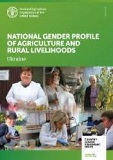
National gender profile of agriculture and rural livelihood - Ukraine, revised
06/2021
Gender equality is a key to eliminating poverty and hunger, as it has been demonstrated by the FAO throughout its research worldwide. As part of the FAO efforts on generating evidence and knowledge, and in compliance with the FAO Policy on Gender Equality, the purpose of the Country Gender Assessment for Ukraine is to contribute to the production of knowledge for better informed, targeted and gender sensitive actions in agriculture and rural development. 22/06/2021
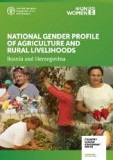
National gender profile of agriculture and rural livelihood - Bosnia and Herzegovina
09/2021
Despite the legal and policy foundation of BiH, gender considerations have only marginally been mainstreamed in state and entity policies on rural development or other sectors related to agriculture. At the state level, the Strategic Plan for Rural Development of Bosnia and Herzegovina (2018-2021) addresses support for women as a cross-cutting initiative but fails to fully mainstream gender. 2021, 94 p.
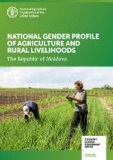
National gender profile of agriculture and rural livelihoods: The Republic of Moldova
05/2022
National gender profile of agriculture and rural livelihoods: the Republic of Moldova reflects FAO’s commitment to promoting gender equality, while integrating a gender perspective into its operations. The report focuses on the intersections of gender, agriculture and rural development, and presents a snapshot of critical gender-based inequalities and their consequences for agricultural production and rural livelihoods in the Republic of Moldova. The assessment includes recommendations.
![cc2041en_200[1]](/images/reulibraries/default-album/cc2041en_200-1-.tmb-th600x450.jpg?Culture=en&sfvrsn=b4cd878d_1)
National gender profile of agriculture and rural livelihoods - The Republic of Azerbaijan
07/2022
This country gender assessment (CGA) for the Republic of Azerbaijan was undertaken as part of FAO and national commitments to promote gender equality while integrating a gender perspective into its operations. The resulting CGA report focuses on the intersections of gender, agriculture and rural development, and presents a snapshot of critical gender-based inequalities and their consequences for agricultural production and rural livelihoods in Azerbaijan.
Regional gender newsletter
- November 2020 - Issue #1
- February 2021 - Issue #2
- May 2021 - Issue #3
- July 2021 - Issue #4
- November 2021 - Issue #5
- March 2022 - Issue #6
- May 2022 - Issue #7
- August 2022 - Issue #8
- December 2022 - Issue #9
- April 2023 - Issue #10
- July 2023 - Issue #11
- October 2023 - Issue #12
- March 2024 - Issue #13
- May 2024 - Issue #14
